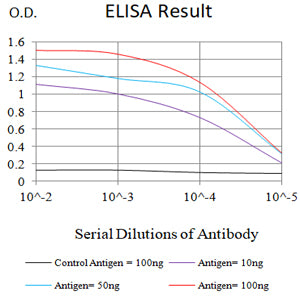
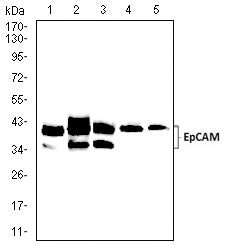
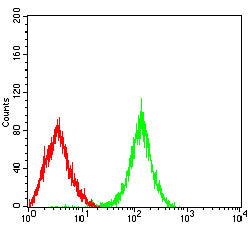
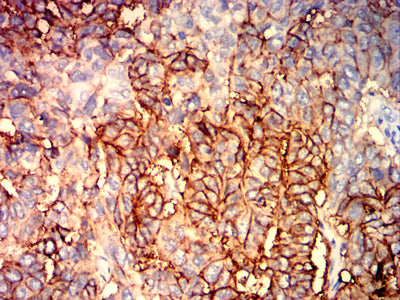
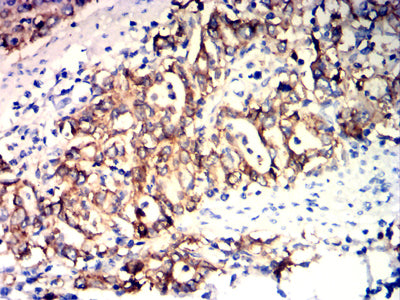
| WB | 1/500 - 1/2000 | Human,Mouse,Rat |
| IF | 咨询技术 | Human,Mouse,Rat |
| IHC | 1/200-1/1000 | Human,Mouse,Rat |
| ICC | 技术咨询 | Human,Mouse,Rat |
| FCM | 1/200-1/400 | Human,Mouse,Rat |
| Elisa | 1/10000 | Human,Mouse,Rat |
| Aliases | ESA; KSA; M4S1; MK-1; DIAR5; EGP-2; EGP40; KS1/4; MIC18; TROP1; EGP314; HNPCC8; TACSTD1 |
| Entrez GeneID | 4072 |
| clone | 6C7F7 |
| WB Predicted band size | 35kDa |
| Host/Isotype | Mouse IgG1 |
| Antibody Type | Primary antibody |
| Storage | Store at 4°C short term. Aliquot and store at -20°C long term. Avoid freeze/thaw cycles. |
| Species Reactivity | Human |
| Immunogen | Purified recombinant fragment of human EPCAM (AA: extra(116-265)) expressed in E. Coli. |
| Formulation | Purified antibody in PBS with 0.05% sodium azide |
+ +
以下是3篇关于EPCAM抗体的代表性文献摘要,供参考:
---
1. **文献名称**:*EpCAM (CD326) as a target for cancer immunotherapy*
**作者**:Munz M, et al.
**摘要**:该综述总结了EPCAM作为肿瘤免疫治疗靶点的潜力,讨论了其单克隆抗体(如Edrecolomab)在临床中的应用,包括抑制肿瘤生长、促进抗体依赖性细胞毒性(ADCC)的作用机制,以及其在不同实体瘤中的表达特异性。
2. **文献名称**:*The role of EpCAM in cancer stem cells and epithelial-mesenchymal transition*
**作者**:Trzpis M, et al.
**摘要**:研究分析了EPCAM抗体在识别癌症干细胞(CSCs)中的应用,指出EPCAM高表达与上皮-间质转化(EMT)相关,并探讨了其抗体在靶向肿瘤起始细胞和抑制转移中的潜在价值。
3. **文献名称**:*EpCAM: Structure and function in health and disease*
**作者**:Litvinov SV, et al.
**摘要**:本文详细解析了EPCAM蛋白的分子结构,并综述了其抗体在疾病诊断(如循环肿瘤细胞检测)和治疗(如抗体药物偶联物)中的双重应用,强调了其在维持上皮细胞粘附和信号转导中的关键作用。
---
如需具体文献来源或更多信息,可进一步提供DOI或PMID编号检索原文。
The epithelial cell adhesion molecule (EpCAM), also known as CD326. is a transmembrane glycoprotein widely expressed on the basolateral surface of epithelial cells. It plays a critical role in cell-cell adhesion, proliferation, and stem cell maintenance. EpCAM is overexpressed in many epithelial-derived cancers, including breast, colorectal, and ovarian cancers, making it a valuable biomarker for tumor detection and therapeutic targeting.
EpCAM antibodies are immunological tools designed to specifically bind to EpCAM's extracellular domain. These antibodies are extensively used in research and diagnostics. In experimental settings, they facilitate the identification and isolation of epithelial cells or cancer cells via techniques like flow cytometry, immunohistochemistry, or immunofluorescence. Clinically, EpCAM-targeted antibodies have therapeutic applications, such as in antibody-drug conjugates (e.g., Edrecolomab) or CAR-T cell therapies, where they direct cytotoxic agents to malignant cells.
However, EpCAM's role remains complex. While its overexpression correlates with tumor aggressiveness, it also exhibits context-dependent functions in tissue regeneration and stem cell regulation. Consequently, EpCAM antibodies serve dual purposes: advancing cancer research by elucidating tumor biology and enabling the development of precision oncology treatments. Their utility underscores the importance of EpCAM as both a biological marker and a therapeutic avenue in epithelial malignancies.
×